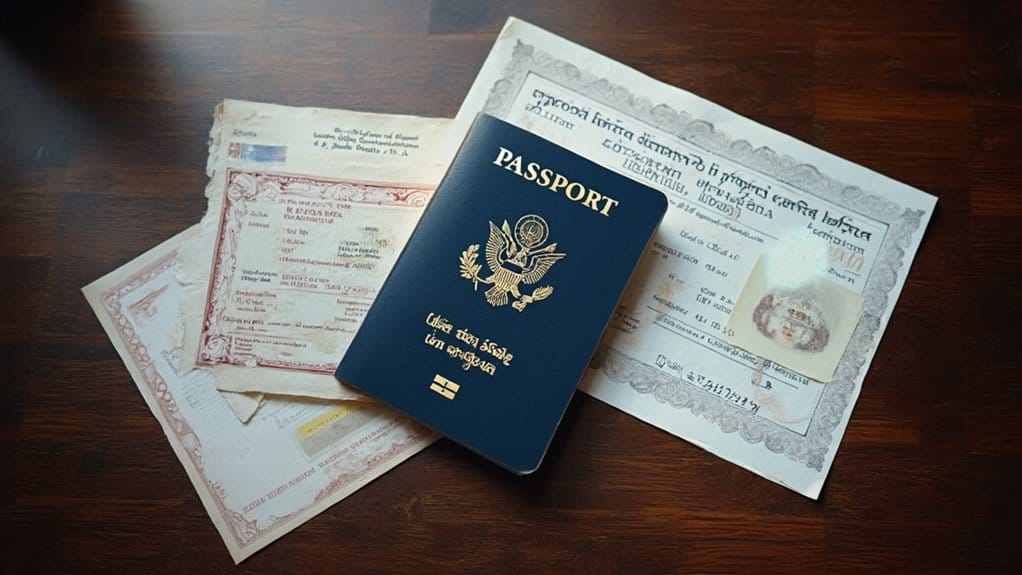When crossing the Canadian border, you'll need specific documents to guarantee a smooth journey. For air travel, a valid passport is essential, while land and sea crossings offer more options like NEXUS cards or enhanced driver's licenses. U.S. citizens can use passport cards for land/sea travel, but they'll need a full passport for flights. If you're traveling with kids, bring their birth certificates and parental consent letters. Don't forget your vehicle registration and insurance papers if you're driving. Pro tip: consider getting travel health insurance too – there's a lot more to know about making your border crossing hassle-free.
Key Takeaways
- Valid passport is the primary requirement for all travelers, with alternatives like NEXUS or enhanced driver's licenses for land/sea crossings.
- Non-visa exempt visitors must obtain a Canadian visa, while most others need an Electronic Travel Authorization (eTA) for air travel.
- Children require passport, birth certificate, and written permission from both parents or legal guardians when traveling.
- Vehicle documentation, including registration and insurance papers, must be presented when crossing by car.
- Customs declaration forms must be completed accurately, declaring all goods, whether submitted in advance or upon arrival.
Primary Travel Documents
Multiple travel documents are accepted for crossing the Canadian border, but your requirements will depend on your citizenship and travel method. If you're a Canadian citizen, your most reliable bet is a valid Canadian passport – it's like having a golden ticket that'll get you across without any fuss. Applications through Service Canada can take several weeks to process, so plan accordingly. You've also got some handy alternatives for land and sea crossings, including those nifty NEXUS cards (they're real time-savers!) and enhanced driver's licenses from select provinces.
For our American friends, you'll need your U.S. passport for air travel – no exceptions there! But if you're driving or taking a cruise, you've got more options, like the wallet-friendly passport card or those same trusted traveler cards that Canadians use. And here's a pro tip: some U.S. states offer enhanced driver's licenses that'll work just fine for land crossings.
If you're a permanent resident of Canada, don't forget your PR card – it's your ticket back home! And for everyone else, you'll need a valid passport, plus any required visas or permits. Remember, when it comes to border crossing, it's always better to be over-prepared than caught off guard!
Visa Requirements and Exemptions

Maneuvering Canada's visa requirements might seem tricky at first, but it's actually quite straightforward. If you're lucky enough to be from one of the 53 visa-exempt countries, you won't need a visa at all – though you'll still need an Electronic Travel Authorization (eTA) if you're flying in.
Here's where it gets interesting: if you're a U.S. citizen or permanent resident, you've got it even easier – no visa or eTA required! And if you're a French citizen living in Saint Pierre and Miquelon heading straight to Canada, you can skip these requirements too. For everyone else, you'll need to secure a temporary resident visa before packing your bags. Visitors with a valid U.S. non-immigrant visa can enter Canada without obtaining a separate Canadian visa, though they'll still need an eTA for air travel.
Don't forget about those special transit programs! If you're just passing through Canada, the Transit Without Visa Program or China Transit Program might be your ticket to hassle-free travel, especially if you're flying with approved airlines like Air Canada or Air China. Just remember, whether you need a visa or not, you'll still have to meet basic health and financial requirements. Border officers typically grant stays up to six months, but they might adjust this based on your circumstances – so keep your travel plans flexible!
Crossing With Children
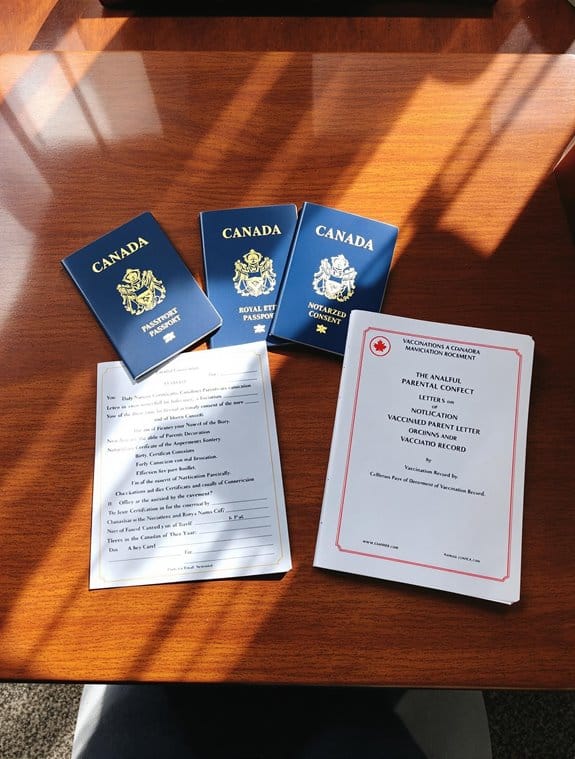
Traveling to Canada with children requires three essential types of documentation: identity proof, parental consent, and legal custody papers when applicable. Whether you're heading north for a family vacation or sending your child to summer camp, you'll need to be thoroughly prepared with the right paperwork. Documentation should be prepared in English or French.
If you're traveling as a single parent, you'll need a letter of authorization from the non-traveling parent, along with their contact information and a copy of their signed passport. Don't forget to pack your child's passport and birth certificate too – they're absolute must-haves! If you're divorced or separated, you'll also need to bring along those custody documents (trust me, border agents take this stuff seriously).
Here's a pro tip that'll save you headaches: get that consent letter notarized. It's not technically required, but it'll make your border crossing smoother than maple syrup! And if you're sending your little one with grandma or a school group, you'll need written permission from both parents, including everyone's contact details. Remember, when it comes to crossing borders with kids, it's better to over-prepare than face delays at customs.
Health Insurance Documentation
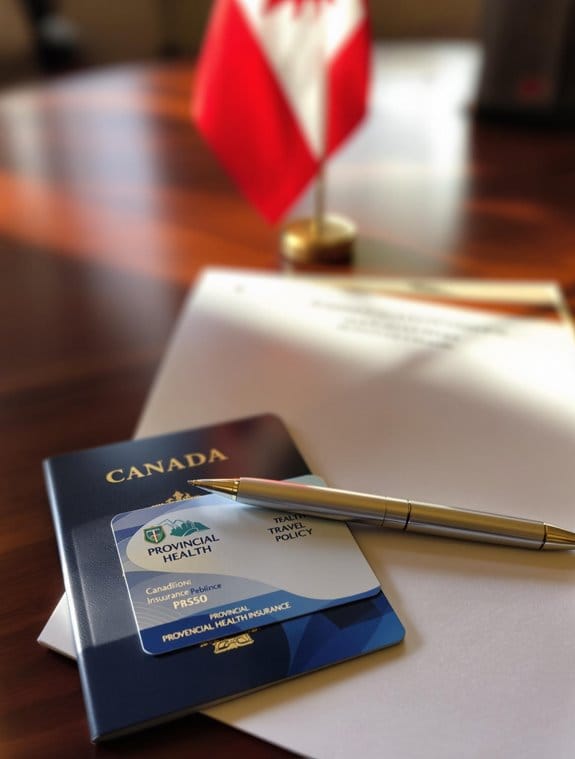
When it comes to health insurance documentation, you'll need to navigate different requirements based on your destination province in Canada. Whether you're heading to British Columbia's gorgeous coastline or Quebec's charming cities, each province has its own health insurance plan you'll want to check out before crossing the border. For instance, if you're bound for Ontario, you'll need to look into the Ontario Health Insurance Plan, while those heading to Alberta will encounter a different system altogether.
Don't make the rookie mistake of relying solely on your home country's insurance! Even if you're just planning a quick drive through multiple provinces, you'll want to grab some additional medical coverage – trust me, it's better to be safe than sorry when you're far from home. If you're a temporary worker, there's good news: your employer should handle the workers' compensation coverage once you arrive. But here's a pro tip that'll save you headaches: purchase supplemental travel insurance regardless of your destination province. Those stunning Canadian landscapes are much more enjoyable when you know you're properly covered for any unexpected medical situations! You'll need to demonstrate that you have sufficient funds or insurance to cover any potential medical emergencies during your stay.
Vehicle Registration Papers
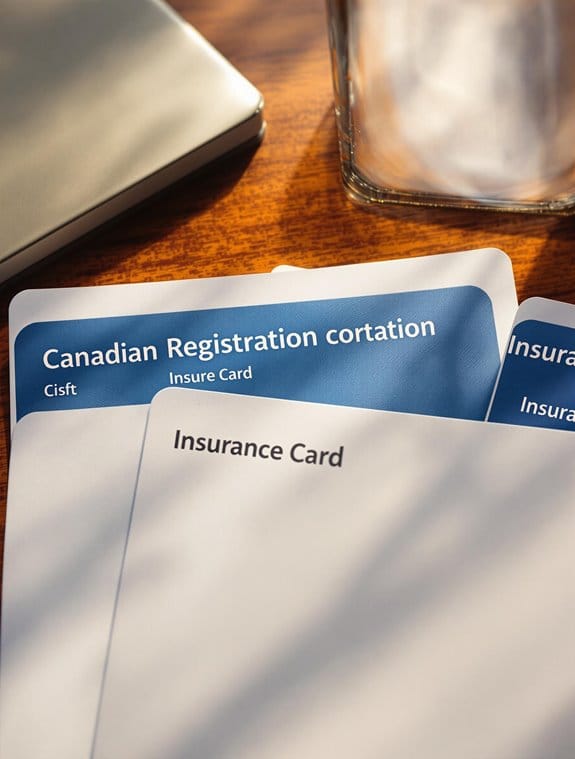
Every traveler driving into Canada must have their vehicle registration papers readily available at the border crossing. You'll want to guarantee these documents clearly prove you're the rightful owner of the vehicle, as border officials take stolen vehicles and duty evasion very seriously. Keep documents accessible and organized rather than packed away in luggage.
If you're planning to drive across the border, you'll need different documentation depending on your situation. For rental cars, don't forget to get specific cross-border permission from your rental company – trust me, you don't want that headache at the checkpoint! And while insurance requirements aren't as strict as Mexico's (where you absolutely must have those papers), it's still smart to bring your insurance documentation along.
For those of you thinking about importing a vehicle permanently, you'll need to jump through a few more hoops. Make sure your vehicle is on the Registrar of Imported Vehicles Compatibility List – I've seen plenty of disappointed faces when vehicles didn't make the cut! You'll need special forms like the Vehicle Import Form and might need to schedule an RIV inspection. Temporary residents, you've got your own set of rules to follow, so check those requirements carefully.
Border Declaration Forms
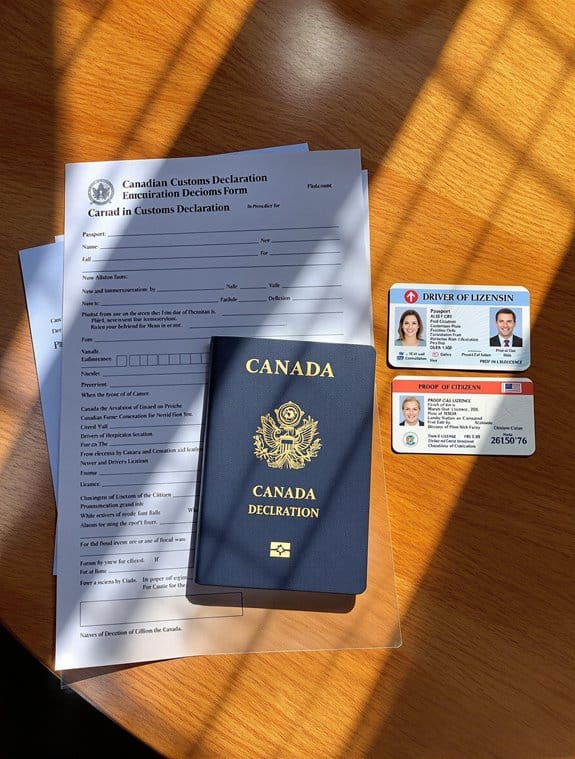
Border declaration paperwork forms an essential part of entering Canada legally and smoothly. You've got two main options: submit an Advance Declaration through ArriveCAN up to 72 hours before arrival, or complete the traditional Customs Declaration Card. At major airports, travelers can now use identity verification eGates for faster processing. Trust me, the advance option can be a real time-saver!
When you're filling out either form, you'll need to be completely honest about everything you're bringing into Canada – from that bottle of wine you picked up duty-free to those gifts for your Canadian friends. If you're moving to Canada, don't list your personal and household items on these forms; you'll handle those separately. Instead, focus on declaring items like alcohol, tobacco, and any business-related goods.
At the airport, you'll either retrieve your advance declaration receipt at a kiosk or present your completed declaration card to the border services officer. Don't forget to keep all your documents handy, including identification for everyone in your family. Remember, failing to declare items isn't worth the risk – those fines and potential imprisonment aren't exactly the warm Canadian welcome you're looking for!
Personal Identification Options
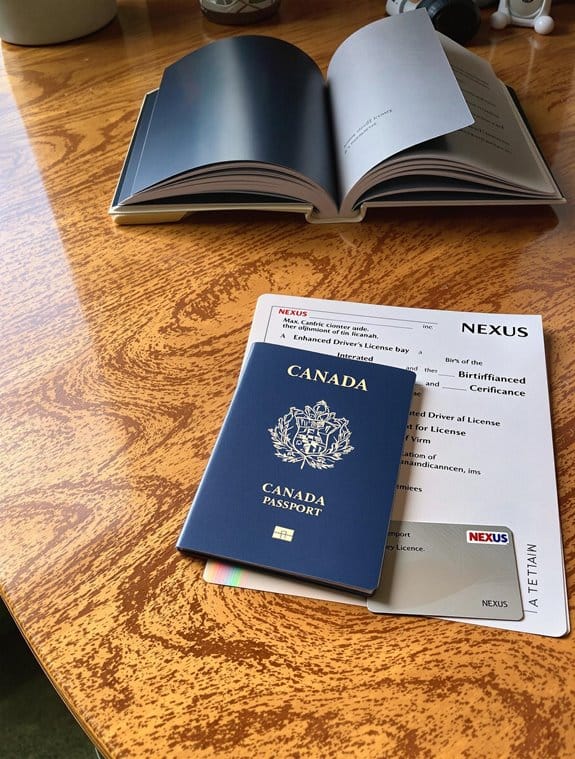
Preparing for your Canadian border crossing requires having the right identification documents in hand. Whether you're a Canadian citizen or an international traveler, you'll need proper government-issued ID that includes your photo, name, and date of birth – and don't even think about bringing that expired passport!
If you're Canadian, you've got quite a few options to choose from. Your trusty passport is always a safe bet, but you can also use your driver's license, citizenship card, or even your provincial health card (as long as it has your photo). And if you're a status card holder or government employee, those IDs work too! For our American friends and other international visitors, you'll need either your passport, U.S. permanent resident card, or enhanced driver's license. Make sure your identification is current and valid to avoid any travel complications. Here's a pro tip that's saved many travelers: if you don't have a single ID that meets all requirements, you can actually present multiple valid IDs that together tick all the boxes. Just remember, these documents are like your golden ticket – without them, your border crossing adventure might turn into quite the headache!
Citizenship Proof Documents
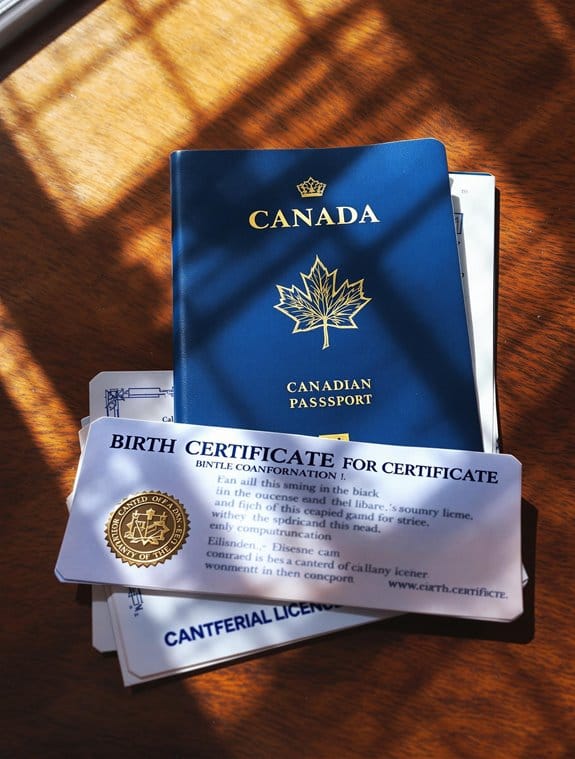
Along with personal ID, you'll need specific documents that prove your citizenship status when crossing into Canada. The most reliable option you can carry is a valid Canadian passport – it's like having a golden ticket that'll get you through borders with minimal hassle. If you're Canadian-born, your birth certificate works great too, though it's smart to pair it with additional photo ID.
For our Indigenous friends, the Secure Certificate of Indian Status (SCIS) is your go-to document, and it'll smoothly get you back into Canada. A NEXUS card can also serve as valid identification when crossing the border. If you've recently become a Canadian citizen, your shiny new Citizenship Certificate will do the trick. Those who've been citizens longer might have older versions of these certificates, and don't worry – they're still valid proof of citizenship.
U.S. folks, you'll need to bring your valid passport when visiting the Great White North. And if you're a U.S. permanent resident, don't forget to pack both your green card and proof of citizenship – they're both essential for your Canadian adventure. Remember, having the right documents makes crossing the border as smooth as maple syrup!
Special Status Cards

When traveling to Canada, you'll find several types of special status cards that can help streamline your border crossing. As a Northern Border resident or frequent traveler, you might want to reflect on applying for a NEXUS card, which acts like a pre-approved pass that'll save you hours of waiting in standard inspection lines. Trust me, there's nothing better than breezing through customs while others are still shuffling through their paperwork! Border services officers will make the final decision on your entry upon arrival at the border crossing.
For Native Americans and First Nations members, you've got access to specific documentation like the Enhanced Tribal Card (ETC) or Status Indian Card, which recognize your unique right to cross the border. These cards are an indication of the historical significance of tribal mobility across these lands. If you're a permanent resident, your Permanent Resident Card (PR Card) is your golden ticket for re-entering Canada – just make sure it hasn't expired, or you'll be telling quite the story at the border! And here's a pro tip: keep your special status card in an easily accessible spot, because fumbling through your bags while the customs officer waits isn't anyone's idea of fun.
Customs Entry Requirements
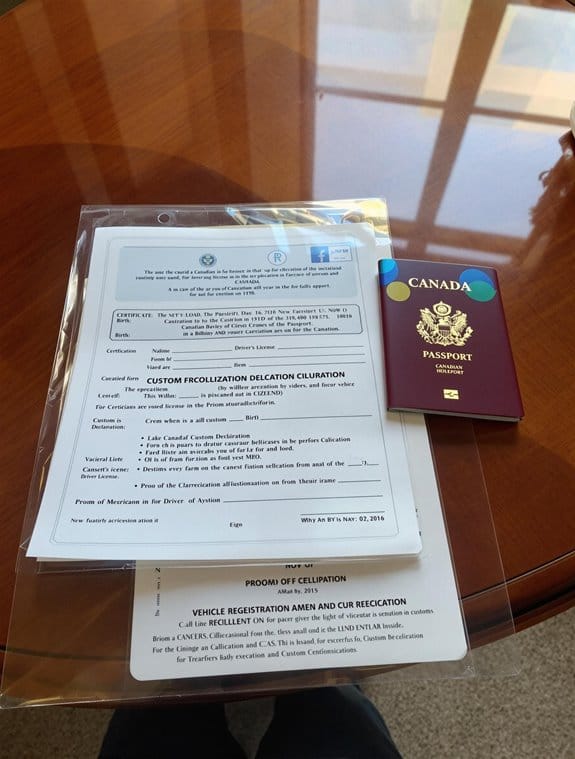
Before you set foot on Canadian soil, you'll need to understand the essential customs entry requirements that govern border crossings. Your passport is your golden ticket, but don't think that's all you'll need – there's quite a checklist to tackle!
Members of trusted traveller programs can enjoy expedited processing at designated entry points. You'll want to get ahead of the game by completing your advance declaration up to 72 hours before arrival (trust me, it's a time-saver at the border). If you're flying in and haven't done this, you'll fill out a declaration card on the plane – it's like a mini-quiz about what you're bringing into Canada! For road warriors crossing by land, you'll need to charm the border services officer with a verbal declaration of your goods.
Speaking of goods, here's where it gets interesting – those duty-free allowances aren't just suggestions, they're the law! And if you're thinking of bringing that exotic plant or your favorite snacks, think again. Food, plants, and animals need special attention, while firearms and alcohol have their own strict rulebook. Keep those receipts handy, and remember, honesty isn't just the best policy – it's the only policy unless you fancy a chat about fines and penalties!
Frequently Asked Questions
Can I Cross the Border With Expired Documents if I Have Proof of Renewal?
You shouldn't cross with expired documents, even with proof of renewal. You'll need either a valid PR card or PRTD for re-entry. Always carry your valid passport and additional identification documents.
What Documents Are Required for Pets Traveling Across the Canadian Border?
You'll need mountains of paperwork for your furry friend! For the basics, you'll need a rabies vaccination certificate, signed by a licensed vet. A detailed pet description and health certificate are also essential.
How Long Can I Stay in Canada Without Additional Documentation?
You can typically stay in Canada for up to 6 months as a visitor. However, a border officer may shorten or extend your stay based on your purpose. You'll need permission to stay longer.
Are Digital Copies of Documents Acceptable at Canadian Border Crossings?
Think you can rely on digital copies? Think again. You'll need physical, original documents at Canadian border crossings – digital versions won't cut it. Border officials strictly require authentic, hard-copy documentation for verification.
What Documents Are Needed When Traveling With Medical Equipment or Prescriptions?
You'll need doctor's notes, medical certificates, and prescriptions in their original containers. For medical devices, carry documentation showing their necessity and labels in both English and French.

